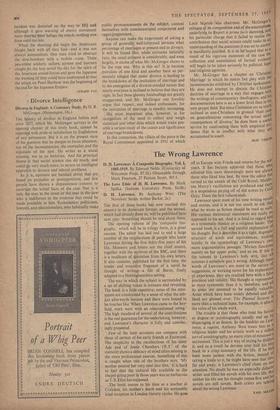The Wrong Lawrence
THE first of these books has now reached this country in its American format, and the second, which had already done so, will be published here next year. Something should be said about them.
The opening volume of the 'composite bio- graphy,' which will be in trilogy form, is a great success. The editor has laid end to end a large number of the rec,pllections of people who knew Lawrence during the first thirty-five years of his life. Memoirs and letters are the chief source, together with the archives of the BBC, and there is a modicum of quotation from his .own letters. It also contains, published for the first time, the tender and evocative fragment of a novel he thOught of writing—a life of Burns, freely adapted to a Nottinghamshire setting.
The way in which the subject is surrounded by a set of shifting voices is intimate and revealing. The book is a little repetitive; some of the state- ments are constrained by a sense of what the sub- ject afterwards became and there were bound to be touches like 'When Lawrence came to the hay- field, work went with an unaccustomed swing.' The high standard of several of the contributions is the real guarantee for the undertaking, however, and Lawrence's character is fully and convinc- ingly presented.
Few of the later accounts can compare with those of certain of his early friends at Eastwood. The simplicity in the recollections Of his sister Ada and of JesSie Chambers ('E.T.' of the memoir) shows a delicacy of mind often missing in the more professional sources. Something of this is caught when one of the brothers says, 'My mother poured her very soul into him.' It is hard to feel that the cultural life available to the chapel-going poor in those years was as barbarous as T. S. Eliot has supposed.
The book moves to his time as a teacher at Croydon, his mother's death and his noticeably kind reception in London literary circles. He goes
off to Europe with Frieda and returns for the war. years. It has become apparent that those wh°: admired him most discerningly were not always; those who liked him best. By now the editor has turned to the annals of the Café Royal; Middle' ton Murry's vacillations are produced and there is a stupendous paying off of old scores by Cecil Gray. There the first volume ends. Lawrence.spent most of his time writing novel' and stories, and it is not too much to ask that what he wrote as fiction should be read as such. His various theoretical statements are really an approach to his art. And it is fatal to regard hint as a systematic thinker or a religious leader. The ,. second book, is a full and careful explanation 01 his, thought. But it describes it as a tight, dogmatic structure of kinds and equivalences, sticking loyally JO the .terthipology of Lawrence's owl more argumentative passages. 'Miriam functions mainly on her upper poles,' and so on. If this is, the sumrna to Lawrence's holy writ, like all summas it somehcAv gets it wrong. Although these words of Lawrence's are more in the nature of suggestions, or working terms for his exploration of experience, they are credited here with a false precision 'arid validity. His thought is represented as more systematic than it is, therefore, and all its areas are assumed to be equally valuable. Areas which have been widely debated and dis" liked are glossed over. The Plumed Serpent is more than a technical lapse, for example, it affect5 the value of his whole work.
The ,trouble is that those who treat his fiction!, as dogma' or autobiography usually end up bA disparaging it 'as fiction, In the booklet on Law';;' rence, a reprint, Anthony West treats him as sr religious leader and his artistic work as a selfish', sort of autobiography, so many cries of missionarYi excitement. This is just a way of saying he dislikes' it, and as a result he devotes over half his tinYl? book to a crisp summary of the life. If he had` been more patient with the fiction, instead ea, taking.a knife to it, he might have seen that this,! far and away, is Lawrence's chief claim on nu!, attention. No doubt he -was an especially didactW„ writer and filled his novels with his own life. 80`. neither his life nor his thought comes first and his novels are still novels. Both critics are talking about the wrong Lawrence.
KARL MILLER
































 Previous page
Previous page